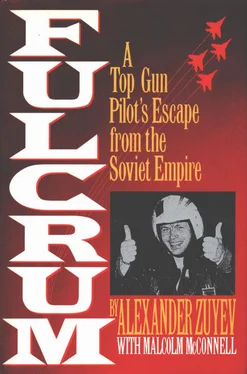As I ducked back under the nose, I saw the R-73 and R-27 missiles slung on the pylons beneath the wings. The missiles’ radar-homing and heat-seeking sensors were capped with canvas ground caps, and the pylon release points were locked with pins. I had no time to prepare the missiles. If any aircraft from this base managed to take off in pursuit, or if another regiment launched interceptors after me, I would have to depend on the plane’s 30mm cannon for self-defense.
The main avionics Pitot tube thrusting from the nose radar dome like a medieval lance was still shrouded with its ground cover, which was linked with an elastic cord to the red aluminum cap of the infrared search and track sensor dome forward of the canopy. I tugged hard on the Pitot tube cover, but it would not rip free.
“Huy’s ney,” I swore. “Fuck it.”
There was no time to drag over a mechanic’s work stand and climb up to strip off this web of canvas and elastic cords. I would have to fly without the major instruments or target acquisition systems. At least I had the angle of attack tube. That instrument, the radar altimeter, and the standby magnetic compass would have to see me through.
I was back on the left side of the nose, scrambling up the orange steel ladder to the canopy. Pausing at the top, I scanned the nearby ramps, the duty-alert building, and operations control tower. To my amazement, I saw no one. They had slept through the noise of the firing. Then I spotted Chomayev, peeking from behind the tail of the number four plane. My vision was still slightly blurred from the blow to my forehead, but I raised my pistol, sighted carefully, and fired. He disappeared. All this firing had to wake someone. I had four minutes at the most before they showed up here on the apron. There was no more time to waste.
The canopy was ajar, still sheathed in the dew-damp ground cover. I couldn’t reach the cover-release points on the other side, so I just shoved the canvas back. It would blow off when I closed the canopy and taxied. I reached inside awkwardly with my left hand, then twisted the canopy opening lever.
I jumped into the cockpit, slid into the ejection seat, and wedged the pistol between my thighs, so that it would be there if I needed it. The unbuckled straps of the ejection-seat harness were stiff against my back. But I had no time to pull the safety pins from the system and strap into the harness. The cockpit felt familiar, even though I hadn’t flown for two months. Then I recalled the generator truck cable still plugged into the left wingroot. Never mind that. The plane’s big engines would blast out enough thrust to pop the cable the moment I advanced the throttles.
Now I had to work fast but well. I breathed in deeply and exhaled to clear my head. My left hand jumped across the main electrical integration panel beneath the right cockpit sill. I used the panel’s quick-start frame to snap on all the circuit breakers with one movement, then flipped off the unneeded switches. The cockpit hummed with power from the onboard battery, and the main caution and warning panel’s red lights blinked on.
I had to ignore the urge to start both engines manually, blast free of the generator umbilical, and taxi out for takeoff. On this advanced aircraft the automatic engine-start sequence I had selected was actually faster than attempting a manual start.
I reached across with my left hand to hit the button for the number two engine auto start. Nothing. Just the dry clicking of the igniter.
My eye shot forward to the voltmeter. The battery was at full charge, twenty-four volts. I hit the starter again. Nothing. I turned and craned my neck out of the cockpit, but saw no one near the apron or alert building. I engaged the starter a third time. Nothing, just that bone-dry click.
I knew I was dead. The Osobists must have installed some secret new coded lock on the starting system of the alert planes. They had locked the throttles of the nonalert aircraft after an intelligence report that Western espionage agents planned to infiltrate the base and steal one of our MiGs. But I never thought they would go so far as to disable the alert planes.
I sagged in the ejection seat. The duty dispatcher was probably already on the emergency radio in the tower. The guard van from regimental headquarters could arrive in less than a minute. I suddenly recalled the last time I had flown, a clear, bright February day. On that final training sortie, I had been alone over the Black Sea, only twenty-five miles from Turkey. As I maneuvered in the mock dogfight, I had dropped below the ground controllers’ radar. How easy it would have been to escape. I had been a fool not to do it then. Now I was finished.
But my years of training would not permit surrender. When a system failed, there was a reason. A good pilot does not panic.
CHAPTER 1
Mikha Tskhakaya “Ruslan” Air Base
February 13, 1989
It was a perfect afternoon to fly. The Georgian winter sunshine poured through the canopy warming the cockpit as I taxied the MiG-29 slowly down the ramp from the 1st Squadron apron to the end of Runway 09. The sky above was a deep, aching blue: ceiling and visibility unlimited. In my curved center mirror, I saw my wingman, Captain Nikolai Starikov, trundling along behind. As always, Nikolai maintained the correct interval between the two fighters.
Steering with the nosewheel control button on my number two throttle, I quickly scanned my engine instruments. Oil pressure and RPM were identical for both of the big Leningrad Klimov RD-33 turbofans rumbling behind me. Their tail pipe temperatures were normal.
I slid the throttles back to idle and braked to a stop at the maintenance checkpoint. While the enlisted mechanic on the ramp checked for leaks and verified that my control surfaces were unblocked, I completed my preflight cockpit check. The canopy was closed and locked. The navigation systems display in the lower left instrument panel was properly aligned and the heading matched the small standby magnetic compass mounted between my center and right cockpit mirrors. I made sure there were no red lights on the caution and warning panel. The fuel gauge read 7,056 pounds, the proper amount for an air-combat training sortie. Now I pulled the lever at my left hip to tighten the harness of the ejection seat.
Below the canopy the young conscript mechanic stared up, then saluted, the signal that he had completed his checks. This was my third and last scheduled training sortie of the day, and, as always, the airplane was behaving well.
That was good. I certainly did not want a maintenance scrub. Although none of my friends back in the ready room or the regimental officers observing the takeoff’s and landings from the control tower could possibly have guessed, I had secretly planned that this training sortie would be my last flight as a Soviet Air Force pilot.
I was glad a dogfight scenario was scheduled. Once Nikolai and I took off’ and headed west for the air-combat zone over the Black Sea, our flight would be immediately followed by the two MiG-29s flown by our opponents, a pair of regimental staff officers. The opponent lead was Lieutenant Colonel Dmitri Shatravka, the newly appointed deputy regimental commander for operations. His wingman was Major Valera Chayka, the regimental intelligence officer. In theory they were more experienced fighter pilots than Nikolai and me. But we had chalked up much more air-combat training in the MiG-29 than either of these two staff officers, and I planned to kick them both squarely in the ass on this flight. An indisputable dogfight victory over senior officers would be a fitting end to my Air Force flying career.
I advanced the throttles and steered carefully down the center of the ramp, keeping well clear of the soft grassy margins. Ruslan had been built after the Great Patriotic War on spongy, reclaimed swampland, and was ringed by reedy drainage canals. The long, single east-west runway was made of huge precast-concrete blocks laid side by side with tar-line joints. In effect, the blocks floated on a wet layer of crushed stone and gravel. Rumor had it that there were at least two sunken runway layers beneath this one. And in wet weather when planes exited the eastern end of the runway, blocks would shift and swamp water would squish through the joint lines.
Читать дальше










